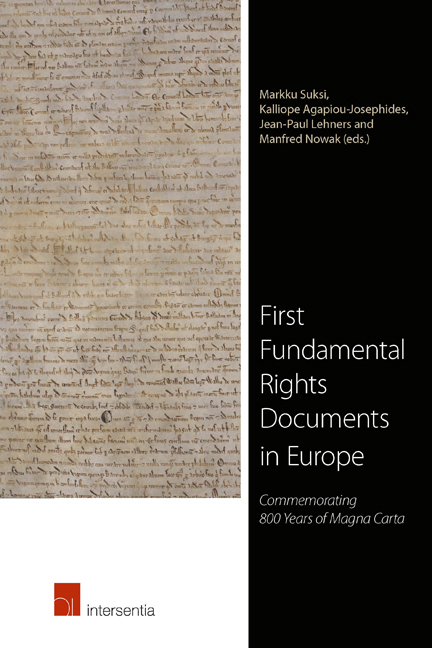Book contents
- Frontmatter
- Preface
- Contents
- List of Authors
- 1 Introduction
- PART I
- PART II
- 11 France: Foundational Importance of the Declaration of 1789
- 12 Sweden: Free Press as a First Fundamental Right
- 13 The Netherlands: The Batavian Staatsregeling as the First Fundamental Rights Document
- 14 Portugal: ‘Tropical Versailles’ in the Beginning of the Nineteenth Century
- 15 Luxembourg: Fundamental Rights in a Small State
- 16 Greece: Reflections from the Hellenic Legal Tradition
- 17 Denmark: In Love with Tradition
- 18 Germany: Fundamental Rights as an Instrument Towards the Rechtstaat
- 19 The Czech Republic: On the Road to Rights and Freedoms
- 20 Romania: The Birth of Fundamental Rights as a Form of Political Contention
- 21 Bulgaria: The Liberal Tarnovo Constitution
- 22 Finland: Rights to Facilitate Participation
- 23 Estonia: First Landmarks of Fundamental Rights
- 24 Slovakia: The Right of a Nation
- 25 Latvia: Second Part of the Constitution as a Project for Next Generations
- 26 The History of Fundamental Rights in Europe: A Long and Winding Road
- Index
18 - Germany: Fundamental Rights as an Instrument Towards the Rechtstaat
from PART II
Published online by Cambridge University Press: 15 December 2017
- Frontmatter
- Preface
- Contents
- List of Authors
- 1 Introduction
- PART I
- PART II
- 11 France: Foundational Importance of the Declaration of 1789
- 12 Sweden: Free Press as a First Fundamental Right
- 13 The Netherlands: The Batavian Staatsregeling as the First Fundamental Rights Document
- 14 Portugal: ‘Tropical Versailles’ in the Beginning of the Nineteenth Century
- 15 Luxembourg: Fundamental Rights in a Small State
- 16 Greece: Reflections from the Hellenic Legal Tradition
- 17 Denmark: In Love with Tradition
- 18 Germany: Fundamental Rights as an Instrument Towards the Rechtstaat
- 19 The Czech Republic: On the Road to Rights and Freedoms
- 20 Romania: The Birth of Fundamental Rights as a Form of Political Contention
- 21 Bulgaria: The Liberal Tarnovo Constitution
- 22 Finland: Rights to Facilitate Participation
- 23 Estonia: First Landmarks of Fundamental Rights
- 24 Slovakia: The Right of a Nation
- 25 Latvia: Second Part of the Constitution as a Project for Next Generations
- 26 The History of Fundamental Rights in Europe: A Long and Winding Road
- Index
Summary
INTRODUCTION
Germany has a short but steady tradition of fundamental rights. The first fundamental rights catalogue was established in 1849 as part of the Paulskirche-Reichsverfassung in Frankfurt. It only lasted for a short time and was never executed, as it lacked support from those responsible to implement it, the dukes and kings of the German confederation at that time. They refused to share the privileges they had over ordinary citizens. Nevertheless, similar to Magna Carta, this first catalogue needed another 60–70 years before entering into force with the Weimar Constitution in 1919. But already in the nineteenth century, the fundamental rights catalogue of the Paulskirche triggered major legal and political reform in the different German states in the Reich. In a way, its fate is reminiscent of Magna Carta 700 years earlier; but it took another 100 years before the enactment of the current and widely known German Basic Law, the Grundgesetz in 1949. Hence, the first fundamental rights document from 1849 paved the way for what is today known as the Rechtsstaat in Germany and beyond.
PATHWAYS TO A FUNDAMENTAL RIGHTS CATALOGUE
The message and spirit of Magna Carta soon spread across Europe and in Germany the wind blew from the North. With the Swedish invasions and wars in the most northern part of Germany in the fourteenth century the ideas of freedom and liberty for those suppressed in servitude after hundreds of years of serfdom and peonage caught fire. Inspired by the changes in Sweden, farmers held in peonage opposed their nobles, claiming more freedom rights on the German island of Rügen in the Baltic Sea. They called their freedom claims ‘little Magna Carta liberatum’ in 1325, claiming more rights and freedom of self-determination against the feudalist order at that time. Their attempt remained a footnote in the history books, but nevertheless showed that the spirit of 1215 had already swept over to the continent.
A more serious attempt to copy and paste Magna Carta from 1215 and transform it into a fundamental rights catalogue for Germany came around 1441, at the beginning of the Reformist wars, the uprisings of the farmers against the feudalism and arbitrariness that had lasted for centuries throughout the continent.
- Type
- Chapter
- Information
- First Fundamental Rights Documents in EuropeCommemorating 800 Years of Magna Carta, pp. 221 - 234Publisher: IntersentiaPrint publication year: 2015



